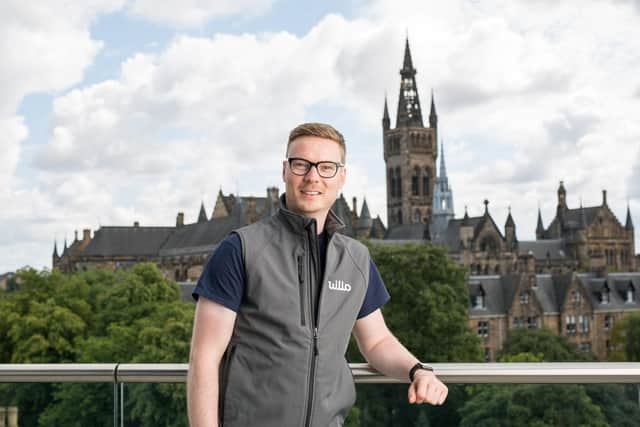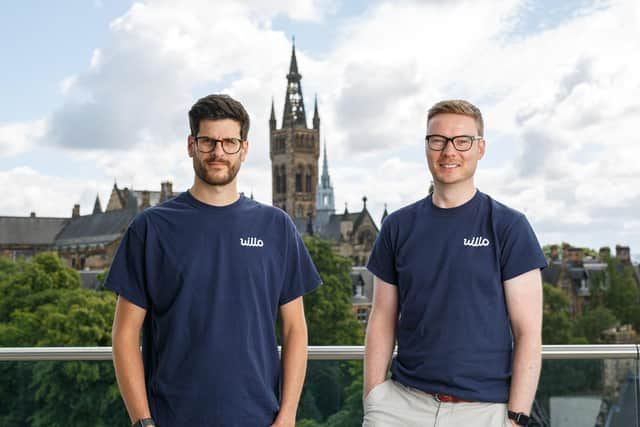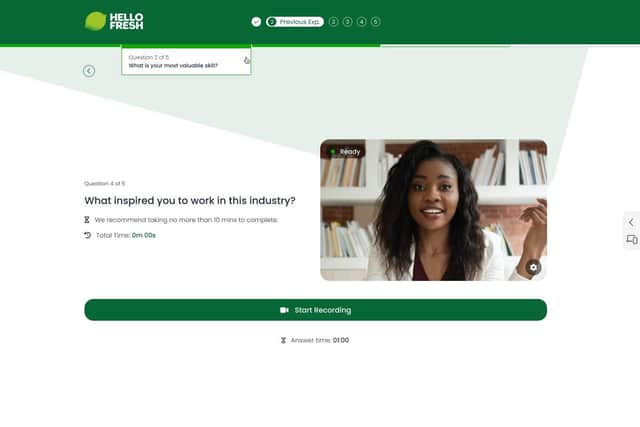Interview: Euan Cameron, co-founder and CEO of Glasgow-based, recruitment-focused tech firm Willo
Euan Cameron is chief executive of Glasgow-based, recruitment-focused tech firm Willo, co-founding it in 2018 (after roles including senior strategic posts at Scottish car dealership Peter Vardy) before it launched in January 2020. It says it is now one of the fastest-growing video interview platforms in the world, working with major organisations including the NHS, Coinbase, and Prada.
Willo will next month reach the fourth anniversary of its launch, and it is now ranked among the top ten video interview software platforms globally. How and why did you get it off the ground, the pandemic must have been key in driving its growth…?
Advertisement
Hide AdAdvertisement
Hide AdThe problem – namely that hiring is broken – was the obvious place to start. The way CVs represent candidates is a relic from 60 years ago and not fit for hiring in the 21st century. As somebody with severe dyslexia, I’d experienced first-hand the challenges that writing CVs present, and I knew there was a better way. Whilst working in another start-up in 2016, I decided to start looking for a more effective and efficient process for employers that was also accessible and engaging for candidates. I wanted to elevate and ultimately redefine the entire hiring process.


We spoke to candidates throughout and they said the same things – they didn’t have any control over the process; it was stressful and expensive having to travel to interviews and involved taking time off; they felt like pieces of paper rather than people – and we formed a vision for a platform that would transform the way interviews were conducted. The pandemic changed everything – lockdowns altered the way everyone thought about video calls forever. Willo met the growing demand, and positioned itself as a crucial asset for companies adapting to the remote work paradigm.
To what extent has your fundraising, including a £1.5 million round announced at the end of 2022 to speed up expansion in the US, accelerated your growth? Do you plan to raise more any time soon?
It’s had a major impact. What’s been particularly interesting about our journey so far, as a Scottish-based start-up, is that 65 per cent of our revenue already comes from the US. Therefore when we took our most recent investment in 2022 it was clear that the additional capital would accelerate what we already did.
In 2023, we grew significantly year on year, and welcomed more household-name businesses and major employers including meal kit firm HelloFresh, Toyota, and, car dealership Inchcape. We’ve invested more than £500,000 in the product, and it has yielded even more engagement from candidates and employers. Investment is important at any stage of business, but how you use it matters more.


How much has support from tech industry experts, including former Mimecast GM Alan Kenny, tech funding dealmaker Kevin Swan, and co-founder of async meeting platform Yac.com Jordan Walker, helped catalyse Willo?
One of the most important lessons I’ve learned is that the more successful and talented people you can surround yourself with, the more successful you’ll be. Everybody, whether advisors, investors, or friends, have helped shape Willo into what we see today. I don't believe it’s possible to build a successful business in a vacuum. I hope that by sharing the Willo story we can also help others earlier in their own business journey. It’s important to foster this environment – one that allows us to celebrate success and failures without criticism.
You became an entrepreneur in high school, was this a goal from a very young age? You’ve also said you believe schoolchildren should be taught more skills applicable to working in business, can you give more detail on this?
Advertisement
Hide AdAdvertisement
Hide AdBoth my parents started businesses in their twenties and I saw it as a natural step to try to create things of value that I enjoyed doing and that people would pay me for. In my teens I saved a good amount of money from business ventures – a gardening firm, website development agency, and handyman – which helped fund me through university.


One of the most surprising things to me growing up was how all the skills I needed to run a business – invoicing, accounts, marketing, speaking to customers, and being optimistic – I learnt from my parents or online. Even in my early twenties, I noticed many of my university-educated peers still lacked practical knowledge of running a business – it’s a major failing in my view, and something we should address in Scotland and throughout the UK.
You volunteered in Peru, did this provide any skills/learnings useful in business?
I helped rebuild a house for a family of four following the 2007 Pisco earthquake. It showed me how to help people in need and how far funds can stretch if they have to. Generally I've found travelling has been beneficial for business, and can stop us losing sight of the bigger picture, and its endless possibilities.
Willo says it is on target to grow turnover to more than £40m by the end of 2025, against a backdrop of aiming to become the world’s premier provider of video interview software. How will you get there – and are you aiming to become a Scottish “unicorn” (valued at at least $1 billion)?
We 100 per cent want to be another Scottish unicorn. Just like Skyscanner changed the way we search for flights, Willo has the momentum to change the way we apply for jobs. We will achieve our goals by replacing the CV and becoming the status quo for recruiting. In 2024 we will embark on our next phase of this movement by running CV-free workshops and certifying employers who fully embrace the move to a more inclusive, accessible, and enjoyable way of hiring. Over the past few years we were selling software, now it's time to start selling Willo as a solution to hiring challenges.
Comments
Want to join the conversation? Please or to comment on this article.